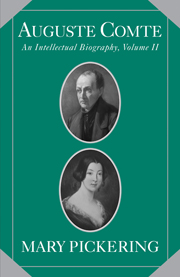
-
Select format
-
- Publisher:
- Cambridge University Press
- Publication date:
- 06 January 2010
- 14 September 2009
- ISBN:
- 9780511596551
- 9780521513258
- Dimensions:
- (228 x 152 mm)
- Weight & Pages:
- 1kg, 652 Pages
- Dimensions:
- Weight & Pages:
You may already have access via personal or institutional login
Book description
This volume begins to explore the life and works of Auguste Comte during his so-called second career, the controversial period that began in 1842 and lasted until his death. This volume covers the years from 1842 to 1852, when Comte transformed his positive philosophy into a political and religious movement. It represents the first in-depth study of that movement. Focusing on key books, such as the Discours sur l'ensemble du positivisme, Mary Pickering connects Comte's intellectual development to the tumultuous historical context and to episodes in his personal life, especially his famous relationship with Clotilde de Vaux. The book examines for the first time why workers, doctors, women, and famous writers, such as John Stuart Mill, George Henry Lewes, and Emile Littré, were drawn to his thought.
Reviews
‘Mary Pickering has now completed what has to be regarded as one of the great biographies of a major nineteenth-century French thinker. What is most obviously impressive about this work is its thoroughness, its mastery of the details of Comte’s life and thought. It is clearly the result of a prodigious effort of research. Hardly less impressive are the depth, the coherence, and the originality of the picture of Auguste Comte that emerges from this biography.’
Jonathan Beecher - University of California, Santa Cruz
'Mary Pickering's monumental intellectual biography is … vigorous and accomplished …'
Source: The Times Literary Supplement
Contents
Metrics
Altmetric attention score
Full text views
Full text views help Loading metrics...
Loading metrics...
* Views captured on Cambridge Core between #date#. This data will be updated every 24 hours.
Usage data cannot currently be displayed.
Accessibility standard: Unknown
Why this information is here
This section outlines the accessibility features of this content - including support for screen readers, full keyboard navigation and high-contrast display options. This may not be relevant for you.
Accessibility Information
Accessibility compliance for the PDF of this book is currently unknown and may be updated in the future.


